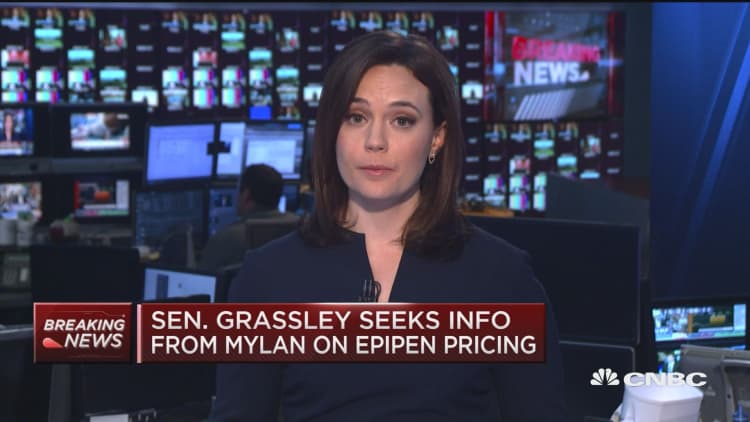Is that a price curve, or a dangerous ski slope in the Alps?
This chart gives a good picture about why consumers are howling, and why several U.S. senators are fuming over the ever-rising price the EpiPen, the auto-injection device made by Mylan that many people with allergies tote around to potentially save their lives in the event of a severe allergic reaction.
The EpiPen sold for $100 in 2008. In the eight years since, the price has more than quintupled, as this chart shows. About 43 million people are at risk from anaphylaxis, or the severe, life-threatening allergic reaction that EpiPen's injection of epinephrine is designed to counteract.
"This outrageous increase in the price of EpiPens is occurring at the same time that Mylan ... is exploiting a monopoly market advantage that has fallen into its lap," Sen. Amy Klobuchar, D-Minn., said last weekend.
Klobuchar, whose own daughter uses an EpiPen, noted that Mylan has seen one competitor, Sanofi's Auvi-Q, exit the market last year due to a recall, and Teva's generic version failed to receive regulatory approval.
The senator has called for the Federal Trade Commission to probe the price hikes. Sen. Chuck Grassley, R-Iowa, the head of the Senate Judiciary Committee, has written Mylan asking how EpiPen's prices were determined.

In a statement Monday, the company said "Mylan has worked tirelessly over the past several years advocating for increased anaphylaxis awareness, preparedness and access to treatment for those living with potentially life-threatening (severe) allergies."
"Ensuring access to epinephrine — the only first-line treatment for anaphylaxis — is a core part of our mission," the company said.
Mylan said that last year, almost 80 percent of commercially insured patients using a MyEpiPen Savings Card received an EpiPen for no charge, and that more than 700,000 EpiPens have been distributed in schools in 2012.
The company also said, "With the current changes in the healthcare insurance landscape, an increasing number of people and families have enrolled in high deductible health plans, and deductible amounts continue to rise."
"This current and ongoing shift has presented new challenges for consumers, and now they are bearing more of the cost. This new change to the industry is not an easy challenge to address, but we recognize the need and are committed to working with customers and payors to find solutions to meet the needs of the patients and families we serve."



